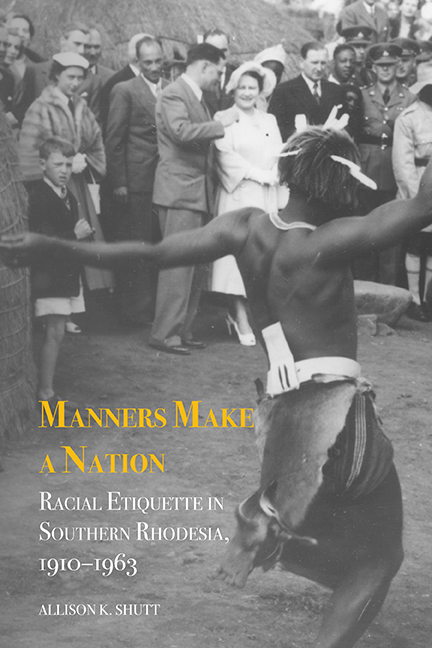Introduction: Manners Mattered
Published online by Cambridge University Press: 04 June 2021
Summary
When I began this study a colleague wryly observed that there was no file titled “Manners” in Zimbabwe's National Archives. True enough, but anyone who reads some files in the archives quickly becomes familiar with whites’ preoccupation (it would be fair to call it an obsession) with manners and their connection to prestige, honor, and governance. Likewise, it becomes apparent just as quickly that Africans were deeply interested in manners as well. They shared strategies about how to protect their dignity in the face of rude and sometimes violent whites, petitioned the government to recognize their cultured manners and grant them the rights of citizenship, and argued over rudeness as a strategy to win political and social rights. What is more, the precise observations of racial interaction recorded in documents, etiquette manuals, official reports and complaints, court cases, and letters in newspapers provide a detailed history of people's changing understanding and practice of proper behavior. While there is no one file titled “Manners” in Zimbabwe's National Archives, there is a rich evidence base for manners and their significance.
My study of manners is possible because over the past two decades historians of Zimbabwe have deepened our knowledge of the desires of the self-styled respectable middle class, the gender and class dynamics of urban life and politics, and, most recently, the idea of being white in contemporary Zimbabwe. I also build on scholarship in colonial African studies that has explicitly linked etiquette to legislative and political struggles for citizenship (in the early Cape) and examined the tactical uses of rudeness in generational struggles over nationalist leadership (in colonial Buganda). This book also draws insights from the broad literature on manners, but particularly from studies of racially conflicted populations where codes of behavior were integral to the ruling ideology.
A study of manners is necessarily a study of daily, ordinary interaction and consequently an examination of how people learned how to think and behave in a racial society. As such, this book contributes to the rethinking of the Zimbabwean past by highlighting how manners connected individuals to larger social processes and how debates over etiquette reflected society-wide conflicts and confusions over race and status.
- Type
- Chapter
- Information
- Manners Make a NationRacial Etiquette in Southern Rhodesia, 1910–1963, pp. 1 - 20Publisher: Boydell & BrewerPrint publication year: 2015

